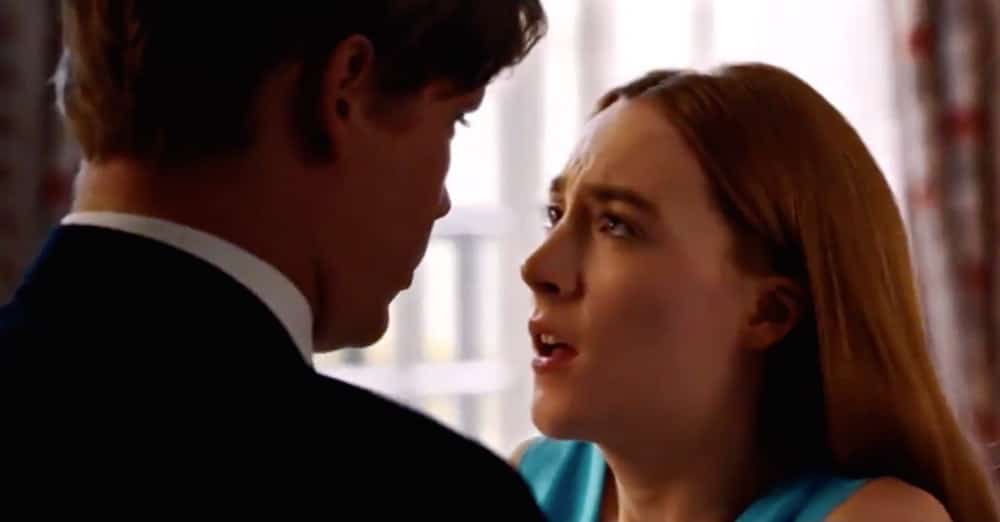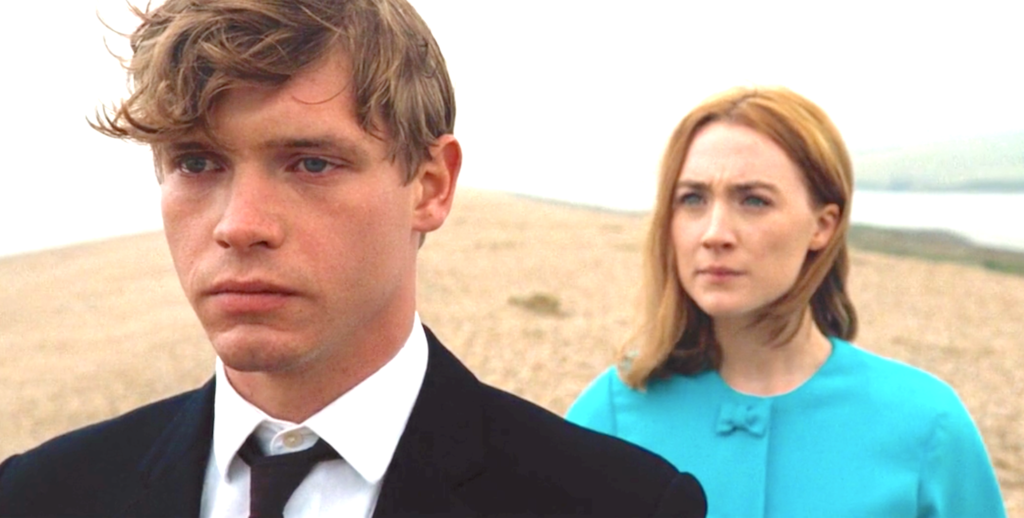In On Chesil Beach (starring Saoirse Ronan), sex causes the breakdown of a relationship because the couple doesn’t have the language to discuss it. Read our On Chesil Beach Special Issue, which we published in 2017.

It starts with an unfortunate metaphor in a sex manual for married women. “Women are like doorways. Men enter them,” reads bride-to-be Florence (Saoirse Ronan). The book goes on to describe the process of a penis getting engorged with blood, after which, the man lies on top of the woman, when it becomes “perfectly acceptable” for her to use a hand to “guide him in.” The language gives Florence all the wrong ideas about sex: it’s an invasion, a rite of passage required for reproduction, an act with a rulebook, and worst of all, it has very little to do with female pleasure — which goes completely unmentioned. Because she doesn’t have any other way to talk about sex, she doesn’t have any other way to think about it either — the sex manual’s distorted description becomes a self-fulfilling prophecy.
In Dominic Cooke’s On Chesil Beach (2017), based on the novella by Ian McEwan which he adapted himself, the vocabulary the characters have to talk about something directly affects how they think about and experience it. It’s 1962, and sex is the one thing Florence and her new husband, Edward (Billy Howle), don’t know how to talk about. This means they don’t know how to have it, collaborate on it together, and deal with it in the same way they deal with everything else in their otherwise excellent and communicative partnership. The film pivots around their wedding night, gradually leading up to their catastrophic attempt at sex, with nested flashbacks to their courtship so we can understand that their relationship flourishes in every other context. Their inability to talk about sex before, during, or after the act is what breaks them apart.
Listen to our podcast on On Chesil Beach and Normal People
As seen in flashbacks, outside of the bedroom, out in the world, they are an unstoppable team. Florence helps Edward with his family: his mother is an inward woman with severe brain damage, and Florence quietly helps her find joy and solace through painting and food, bringing Edward’s entire family together. Edward’s long hair, penchant for blues music, and tendency to ride a bike down a steep hill with no brakes, suggests he is unworried about conventions. This complements Florence’s own quiet rebellion against her posh upbringing: she protests against nuclear war to her mother’s chagrin, and she wants to work as a musician running her own quartet, a shocking ambition for a woman in 1962. It makes them a perfect match.

They talk at length about what they love, sharing the language for it: the names of birds, the terms to describe music. She invites him into her world of classical music; he listens, learns, and becomes absorbed in it. When he describes his world of rock music, she gives him the vocabulary to describe the chords and rhythms. He invites her into his world of nature, teaching her how to identity and name birds and flowers, and she adores it. They’ve studied their passions, so they have the words to communicate them with each other, and it brings them together.
By contrast, sex in their world is caged in such secrecy that they haven’t learned any useful way to express their thoughts and feelings about it. The only way Florence has heard sex described before her wedding night is as an act of invasion, via the sex manual’s doorway metaphor. When Florence reads the passage, in a flashback, she’s seated next to the door of her bedroom and interrupted first by her sister who knocks, and then by her mother who simply barges in. On her wedding night, her first moment of intimate connection with Edward is also interrupted by someone at the door, a pair of hotel servers who serve them dinner and make it so awkward they can’t talk about anything at all.
Edward has more experience talking about sex, but only through platitudes shared by men, which may have even less basis in reality than Florence’s sex manual. In a flashback, we hear him bragging about how to get a woman to sleep with you; minutes later, in the present, we find out he’s actually a virgin. He only knows how to describe what he thinks sex is supposed to be about or what his role is supposed to be in it: in search of a goal. In the hotel room, he keeps repeating tired cliches about sexual desire intended as flattery (“with my body, I thee worship”) rather than talking to Florence like the partner she has been to him in every other way.
The doorway metaphor had primed Florence to expect sex to be an attack, and Edward delivers. He paws at Florence, devours her face with what he thinks is a kiss, and almost tears her dress when he tries to unzip it. It’s not an exchange of intimacies, but a one-way taking, in line with the language he’s heard to describe sex, as a predator in search of a conquest. Florence tries desperately to bring back their shared language in order to stop him from going down this path of treating her like an object to be possessed. She wants to connect emotionally, to talk, invoking their shared language where he refers to her hands as her “vibrato.” But he has no idea how to handle that: the words he has associated with sex are to admire her legs, not to talk about his feelings. For Edward, sex is a demonstration of his manhood, and thus must be an act of dominance; he’s deflowering her, not exploring something new together. Instead of engaging with Florence and getting help to, for example, undress her, he starts barking orders and bullying her; his go-to instructions are “stay still” and “don’t move”. It’s uncalled for in any circumstance, but given Florence’s history with an emotionally (and sexually) abusive father, Edward’s behaviour only triggers her more in what is already a triggering situation.
Because doorways are thresholds that you pass through, Florence assumes that sex is a rite of passage to be dealt with once. They’ve been married for only a couple of hours when she announces her intention to name their daughter Chloe, skipping ahead to the result of the sex, as if this were the whole purpose. Edward’s embarrassment about his own inexperience reminds us that, for both of them, sex is so much about virginity. In a flashback, Cooke pans through a movie theatre where everyone in the audience is necking, finally landing on Edward and Florence. Looking at his peers, Edward feels he must keep up, so he tries tries to skate his hand up Florence’s leg, while Florence remains oblivious, the only person in the cinema actually watching the movie. He knows what the end goal is, and he hasn’t thought much about how to get there and what to do next. Neither of them have.
The film’s structure parallels this mindset. It takes ages for them to get onto the bed and to the sex, not just because they have the world’s most awkward dinner where the sounds of cutlery clinking are deafening. The film starts at the beginning of their honeymoon, and we play catch up on their courtship as they inch toward its consummation. Each piece of their history brings us closer to what should be them coming together, finally, as an official couple and as adults. This means we, too, feel the pressure they feel to get it over and done with, to pass through that doorway.
When Edward and Florence share dinner in their hotel room, it should be a time for reconnecting: talking openly is what they do best. But Cooke and production designer Suzie Davies have deliberately put the garish red bed right behind Florence, so that it looms over their entire conversation at the back of the frame: it’s all Edward can see and think about, and Florence has her back to it, as if avoiding all thoughts of it. Up until the sex, all the movement in every frame — in the present or in flashbacks — is toward the right, because the way they’ve shot the hotel room puts the bed in the far right of the frame. In fact, Davies designed a slightly oversized hotel room so that we could feel the couple’s excruciating progress, inch by inch, toward the bed, making crossing that threshold an even more momentous act.

Everything Edward and Florence know about sex is from a proscribed script: Florence’s sex manual, and the whispers Edward has heard about sex as something men do to women, something to brag about. When things go awry, starting with the undressing, they don’t know how to go off-script. Edward gets so carried away with his pursuit of Florence that he ends up on the bed fully clothed, shoes still on, after having removed her stockings and underwear. When he suddenly tries to remove his shoes with one hand so they can proceed, it’s painfully awkward and funny. Whereas Florence and Edward understand that other parts of life require practice, as well as interpretation and improvisation, they treat sex like an entirely foreign act: one where there’s only one right way to do it, where you’re supposed to get it right immediately, and where you can’t even talk about it when something goes wrong.
As a musician, Florence knows that sheet music will tell you the notes to play, but figuring out how to play them is something you have to do for yourself. In a flashback, she explains to the cellist in her quartet that he needs to play the notes tenderly, something that isn’t in the sheet music, but that she instinctively knows and has more specifically learned about the piece. Florence has the vocabulary to give instructions about music to her quartet, and she teaches Edward how to describe music to her. That shared vocabulary enables a sophisticated conversation. Edward, meanwhile, has the vocabulary to describe the birds and stars he spots, which he teaches Florence. Things you can name are things you can understand and learn to spot and identify. Because sex is this secret thing for which they have a known destination but no language to describe the path there, they expect it to be easy and straight-forward, without roadblocks or detours.
Sex has been presented to them in such a regimented way that Florence assumes the sex manual is more like reading a map — a special expertise of hers — than a piece of music: when she followed her map in a flashback, she navigated unknown terrain with no difficulty and no missteps. Neither of them can fathom that sex might actually require improvisation, practice, and collaboration, not just one person coaching the other like Edward does with naming birds — especially since neither have expertise in this arena. If it took Edward practice to master his winning tennis stroke, why should he expect that sex would be any different? When, in a flashback, Florence visits Edward’s home, and exhibits such sensitivity for dealing with his mother who has brain damage and his sisters who mostly tolerate him, we know that this is, in part, because it’s not her first try. We’re told that she’s visited his home before, so she’s had practice, and they’ve had a chance to discuss and process together — and Edward even warns her about his family, yet again, before she enters his home.
Trapped in their honeymoon suite, without music or nature, they have nothing to mitigate their communication, to give them something to bond over that connects them. Their conversation becomes stilted, and they don’t know how to talk, as much as Florence entreats Edward to do so. Once Edward is lying naked (but for his shirt) on top of Florence, preparing to “enter her,” their entire exchange is reduced to grunts, moans, and half-starts. It scares Florence because she doesn’t understand what’s happening, thinking every moan of pleasure is one of alarm, and Edward only freezes up more. By going entirely silent and ceasing communication, Edward leaves Florence feeling alone in an act that should be intimate — and it’s only exacerbated by the terrifying childhood memories it invokes that she doesn’t fully understand and doesn’t have the language to explain or express. After wiping Edward’s ejaculate off of her leg with horror and anger, she flees the scene of the crime, back onto the beach, looking for a respite.
But when Edward follows her out, he’s incapable of leaving the bedroom and its rules behind. Instead of resuming their easy communication, he doubles down into harmful stereotypes and received wisdom. Florence desperately tries to explain to him how she’s feeling, and he willfully misinterprets her at each stage. She tries to express her uneasiness, but doesn’t have the words to link it to her experience with abuse. And by choosing the unfortunate metaphor of “demands” she feels she’s expected to submit to, she unwittingly invokes money and class, another issue that they have struggled to communicate about, heightening Edward’s insecurity. Rather than let her make her point, he interrupts her, suggesting she thinks of him as a “debt collector,” missing the mark entirely.

They don’t know how to talk about what they’re feeling so they talk around it. He keeps putting words in her mouth, and she’s angry and frustrated so she eventually agrees with his proposition — she was trying to humiliate him by running to the beach — even though it’s not what she really feels. Florence feels lost because sex didn’t go according to the plan laid out by the sex manual or by Edward’s expectations, so she concludes she’s “hopeless at sex”, and he agrees she’s “frigid.” They both jump to this conclusion because if she is incapable of following the plan, then there must be something wrong with her. Sex is a doorway, not a skill, so she doesn’t see sex as a thing you can learn the way you can learn to read a map or a piece of music, or in Edward’s case, master a tennis stroke. Florence tries to explain to Edward why she’s struggling but without the language to discuss her history of sexual abuse, they both fall back on harmful cliches. The more he attacks her, the more she loses her nerve to keep trying when it’s so difficult. Instead of saying what she’s feeling, she makes a proposal that she knows how to articulate: that he should seek sexual satisfaction elsewhere whilst they share a life. While it’s not really what she means or what she wants, her proposal allows her to skirt around the problem to indirectly solve it.
At several points in their conversation on the beach, Florence tries to return things to their shared language, to their private jokes, to rekindle the intimacy that going to bed stole from them. She hears a bird and returns to their game of guessing what type of bird made the sound. It softens Edward momentarily, and there’s a glimmer that if only his temper were under control, his insecurities not so strong, maybe they could find a way to tackle sex as a team in the way they tackle everything else. Florence tries to open communication biasing questions. Edward, instead, makes declarative statements, about what she is, how she feels. She’s trying to negotiate, to work as a team, and he’s trying to draw lines in the sand. In the end, their inability to find a shared language to discuss sex — an act they both understand to be important without really understanding how it should fit into their relationship — is what makes it impossible for them to move forward.


